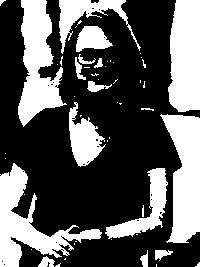The prize was established by members of the Karofsky family, including Peter S. Karofsky ’62, Paul I. Karofsky ’66 and David M. Karofsky ’93, and is awarded annually to a teacher who “best demonstrates the ability to impart knowledge, inspire enthusiasm and stimulate intellectual curiosity.” The 2016 prize is awarded to Emma Maggie Solberg, Assistant Professor of English. She teaches British medieval literature and culture, while her research concentrates on early English drama and the cult of the Virgin Mary. She came to teach at Bowdoin in 2013.
Your passion for English literature is illustrated by the fact that you wanted to do a purely English degree as an undergraduate, so you went to Oxford University didn’t you?
I didn’t want to take any more math classes, I was not very “liberal arts” in my approach to education. I think the last time I took a math class I was 16 years old.
Were you particularly drawn to medieval studies as an undergraduate?
No. When I got to my college, their specialization was medieval, so I had two tutors who were medievalists. So for that reason our education focused mostly on the Middle Ages and I really liked it. I didn’t expect to, but I got into it.
What was your PhD thesis about?
The Virgin Mary in medieval drama. I’m also working on a book about the subject.
What are the courses you teach here?
I’ve taught quite a few courses, I haven’t yet repeated any. I’ve taught a course on Beowulf, called Gods and Monsters, it was a first year seminar. I’ve taught another first year seminar on Joan of Arc, the martyr. I taught a King Arthur 2000 level lecture class. Right now I’m teaching a 2000 level seminar on Chaucer. I taught a 3000 advanced seminar on Science and Medieval Literature. I’ve taught quite a few different courses.
How long do you think before you go back and repeat a course?
I am looking forward to doing that. As soon as I am come back from my sabbatical – which I’m taking in the upcoming academic year to work on my book – I intend to repeat one of my previous courses.
This period is so far removed from the world inhabited by twenty-first century American college students. How do you bring it alive for them?
It is a long way removed, so one thing I try to do is not to oversell it, not to change it, not to teach (Chaucer scholar) Tolkien instead of Chaucer, but to teach the material itself and to do it justice. And I think as soon as students experience the text itself they like it because it’s so surprising, it always shocks. It teaches you something completely new, you hear a voice you’ve never heard before. That’s what I try to set up is a situation where the students hear that medieval voice and respond to it.
Do you read to them in the original medieval dialect?
I resisted doing that for the first couple of years, just because I had never taught medieval literature before and I wasn’t sure if it would work. But this semester for the first time, in the Chaucer class, I slowly methodically, patiently taught Middle English, so all the students could read in Middle English. Some of them are much better than I am at this point, they have beautiful recitation voices. So we all recite in this silly, sing-songy voice, and I think the labor it took to produce that paid off because you can hear the tone of the text very differently if you say it in its own dialect, than if you translate it as you read, and I think the students enjoy it.
So you don’t come at it from a “this is the translation first,” point of view?
No, I taught in translation I think my first semester here. I went back and forth between teaching in translation and teaching the original text. It’s quite difficult to teach English as a second language, it takes maybe a month for students to be able to read fast enough to read more than 10 pages a night. So it’s a slow process, but Bowdoin students are very advanced and capable. They surpassed my expectations so I just started giving them harder and harder stuff to do and I’ve yet to find that they can’t handle it. So now I don’t teach in translation at all.
Your classes cover a long chronological period don’t they?
Almost a thousand years. Some of the earliest texts we read are from the fall of the Roman Empire and we go all the way to the birth of Shakespeare (in the late 16th century).
How do you think you classes fit in to the overall mission of the liberal arts education?
I had a student who signed up for the Joan of Arc seminar because he had never heard about it before and that’s why he took it. So in that sense it is the purest essence of the liberal arts because there’s no economic reason to take it. You take the course purely for curiosity, purely for its own sake. I mean I often will tell the students that learning Middle English will make them much better writers, and it’s true. Because if you learn the origins of the English language you are capable of so much more depth in your speech and writing. If you have a sense of hundreds of years going back, your vocabulary increases; you have a good understanding of grammar and syntax; it’s good for the brain, it’s like playing sodoku. It has its applicability, but I think really what it’s all about is intellectual curiosity and I often think of it as speaking to the dead. The writers we study have been dead for hundreds and hundreds of years, and nobody listens to them. But the texts are right there and all we have to do is pick them up, and it’s really strange what they have to say. It’s bizarre, it’s often difficult to take but that’s worth something in itself: listening.


